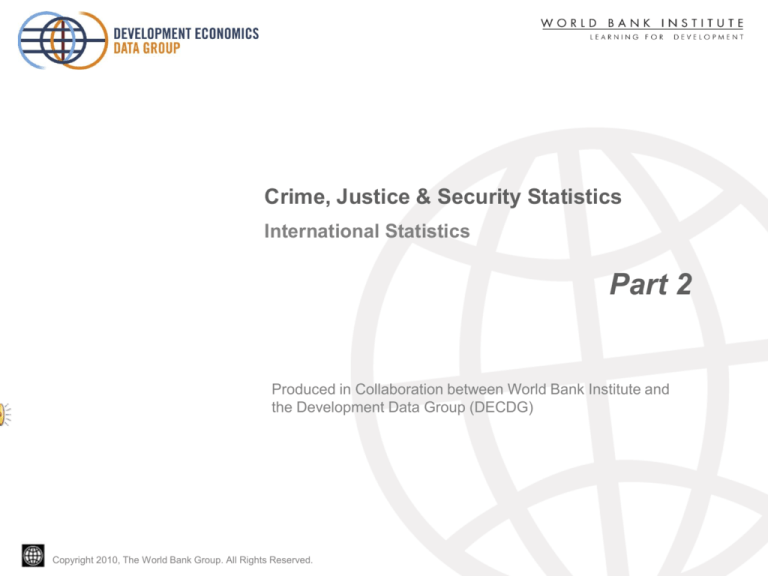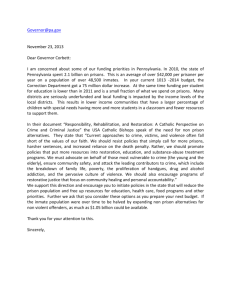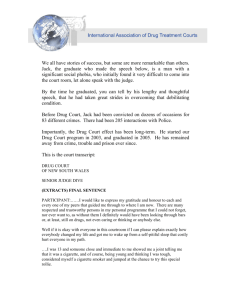
Crime, Justice & Security Statistics
International Statistics
Part 2
Produced in Collaboration between World Bank Institute and
the Development Data Group (DECDG)
Copyright 2010, The World Bank Group. All Rights Reserved.
UN Statistics work in South East
Europe
• UNODC also runs a CARDS program to assist countries
in transition in SE Europe to improve their statistics on
crime and justice
• This covers countries such as Serbia, Romania, Bosnia
& Herzegovina, and Croatia
• More details can be found on the UNODC web site at
http://www.unodc.org/southeasterneurope/en/cardsphase-1.html
2
Copyright 2010, The World Bank Group. All Rights Reserved.
Requests for crime statistics from
international and other agencies
The main organisations that request data on crime and justice from
time to time are:
1.
2.
3.
United Nations Survey on Crime Trends, which is conducted
every three or four years and is now on its 10th sweep
The Collection of Data for around 40+ countries of Europe by the
team producing the European Sourcebook on Crime and Justice
Statistics. This is produced every three or four years and is now
on its fourth sweep.
The collection of victimization data through the International Crime
Victimization Survey. This has been conducted four times an
various intervals since 1990.
The next slides look at each of these collections one by one.
3
Copyright 2010, The World Bank Group. All Rights Reserved.
United Nations Survey on Crime
Trends
• The major goal of this survey is to collect data on the incidence of
reported crime and the operations of criminal justice systems with a
view to improving the analysis and dissemination of that information
globally.
• A questionnaire is sent to each country in the world each time a
sweep is conducted.
• This questionnaire asks for information on the different aspects of
the justice system: crime, police, prosecution, courts, probation and
prisons.
• Parts of the questionnaire (The Module) change for each sweep to
include statistics on specific crime types.
4
Copyright 2010, The World Bank Group. All Rights Reserved.
UN Survey of Crime trends
(continued)
• Copies of the questionnaire for the 11th sweep of the survey are
available in all UN languages at the UN web site
http://www.unodc.org/unodc/en/data-andanalysis/crime_survey_eleventh.html
• The questionnaire is in EXCEL format with 15 work sheets
• The core questionnaire is contained on 11 sheets (7 for police, 1
prosecution, 1 courts, 2 prisons)
• The Module is 4 worksheets (2 police, 2 courts)
• Questions in the Module are rotated every three years on
Trafficking, Corruption and Sentencing.
• There is a also one sheet on illicit trafficking in cultural property,
because of current interest.
5
Copyright 2010, The World Bank Group. All Rights Reserved.
European Sourcebook on Crime and
Justice Statistics
• The European Sourcebook includes data on crime and justice for
40-45 countries, including the EU and countries in transition in
South and East Europe.
• It also includes a good deal of explanations about definitions and
statistical procedures which clarify the statistics included in the
report.
• A questionnaire is produced in English/French and sent to a
national correspondent in each European countries: usually
associated with the justice ministries and not the CSO.
• Details of methodology and data collected can be found on its
dedicated web site: http://www.europeansourcebook.org/
6
Copyright 2010, The World Bank Group. All Rights Reserved.
International Crime Victimization
Survey (ICVS)
• The ICVS is a survey of victimization in different countries. It is less
formal than many other surveys
• countries from all over the world have taken part
• A questionnaire is designed that can be used by all states
participating in the survey: methodologies are also prescribed,
although not all countries can keep to the recommended
methodology exactly
• Countries are asked to survey a relatively small number of potential
victims, perhaps 1,000+ to ask their experience of crime over the
last 12 months.
7
Copyright 2010, The World Bank Group. All Rights Reserved.
ICVS (Continued)
Details of the most recent survey, which was the fifth sweep of the
survey, can be found at http://english.wodc.nl/onderzoeksdatabase/icvs-2005survey.aspx?cp=45&cs=6796
The following victimization is covered:
1. Any common crime
2. Vehicle related crimes
3. Burglary and other theft
4. Contact crimes
5. Non-conventional crimes
Information is also published on
1. Fear of crime
2. Security precautions
3. Public attitudes to law enforcement
8
Copyright 2010, The World Bank Group. All Rights Reserved.
Estimates of extent of hate crime,
2005
9
Copyright 2010, The World Bank Group. All Rights Reserved.
Collections of Internationally
comparable statistics
A constant series of questions always being asked is how an individual
country compares with others in the area of crime and justice:
1.
Is homicide higher
2.
Is the prison population greater:
3.
How many robberies were there
4.
How many rapes
5.
What is the extent of corruption
The next few slides summarize data that is routinely available for the
use of governments, businessmen and international
organizations.
10
Copyright 2010, The World Bank Group. All Rights Reserved.
World Prison Brief
The World Prison Brief is an initiative of an academic institution, The
International Centre for Prison Studies of the University of London, UK.
• The material is found at the World Prison Brief web site:
http://www.kcl.ac.uk/depsta/law/research/icps/worldbrief/
• Information is obtained on the main prison indicators from contacts, mainly
in the prison service of the individual countries.
• The data are presented in a straightforward way so that they are easily
readable. The typical output for an individual country can be found (for
Tanzania) at
http://www.kcl.ac.uk/depsta/law/research/icps/worldbrief/wpb_country.php?c
ountry=48
• The material has a wide coverage with almost every country in the world
responding to the questions.
11
Copyright 2010, The World Bank Group. All Rights Reserved.
UN Crime Trends Survey
• The collection of data for this survey was mentioned in Slides 16
and 17. Material is published in EXCEL format for each sweep of the
survey on: http://www.unodc.org/unodc/en/data-andanalysis/crimedata.html
• Not all countries respond to the questionnaire so the results are
sometimes selective. However, for those countries that do respond
data are easily available and countries that have not responded are
identified.
• Occasional research reports in a more readable format are
produced: eg see the Global Report on Crime and Justice at:
http://www.uncjin.org/Special/GlobalReport.html
12
Copyright 2010, The World Bank Group. All Rights Reserved.
UNODC publications
There are four specific publications series on statistics and
related issues from the UNODC:
1. The series of victimization surveys that have been
conducted for certain African countries.
2. Specific studies of Drugs and crime
3. A comprehensive data base of data on drug seizures
in all reporting countries
4. Studies of global crime issues: eg recent report on
global organised crime
13
Copyright 2010, The World Bank Group. All Rights Reserved.










